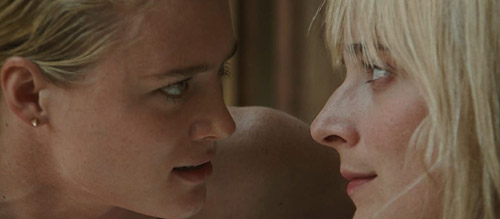Always Shine (2016) Review
This article was written exclusively for The Film Magazine by Jacob Heayes.
Always Shine (2016)
Director: Sophia Takal
Screenwriter: Lawrence Michael Levine
Starring: Mackenzie Davis, Caitlin FitzGerald
Trapping two troubled characters in an isolated getaway is a recipe for trouble; so often is it also a recipe for riveting horror. Sophia Takal’s second feature may walk on well-treaded ground but an injection of postmodernist writing and strong feminist direction ensures Always Shine is anything but familiar. Helmed by two titanic performances from Mackenzie Davis and Caitlin FitzGerald, Always Shine is an immensely unnerving duologue rife with endlessly simmering tensions producing one of the 2010s’ most underrated horror works.
Scripted by Takal’s husband and frequent collaborator Lawrence Michael Levine (Black Bear, 2020), Always Shine tracks the plight of two actresses on opposing ends of the fame spectrum. Beth (Caitlin FitzGerald) despises the demeaning horror films that her agent constantly sends her way, but is nonetheless enjoying her rise to stardom, cemented by an inclusion in the prestigious Young Hollywood magazine. On the other hand, Anna (Mackenzie Davis) rarely finds work outside of unpaid gigs in avant-garde student films, her disillusionment feeding into jealousy over Beth’s success. Travelling to an idyllic cabin in Big Sur, the pair find their friendship tested and their sense of self crumbling as their isolation leads them down a nightmarish path.
Filmmakers often find potent drama in self-reflexive stories surrounding the art of filmmaking. Always Shine builds on decades of tradition through its pacing and dialogue, most evidently from Ingmar Bergman’s radical drama Persona and the unsettling vision of Hollywood depicted within David Lynch’s Mulholland Drive. The quietly intense interplay between Davis and FitzGerald is particularly evocative of Bibi Andersson and Liv Ullmann’s work in Bergman’s film; patient but powerfully emotional. It’s difficult not to recall Persona’s iconic close-ups or its mirror sequence as their identities begin to fuse and their motivations grow evermore opaque. Takal explores similar material relating to dissociation, fame and female identity, yet its influences from contemporary horror and its distinctive voice separate the film from the crowd.
Those familiar with Takal’s recent work with Blumhouse – Black Christmas and New Year, New You – might be surprised by quite how formally experimental Always Shine often feels. Partially funded through Kickstarter, there is an independent freewheeling spirit to Always Shine that is unfortunately absent in Takal’s later work. Despite noble intentions with her Black Christmas remake, the frequent tired jump scares and flat cinematography contradict the revolutionary, provocative style on display in this earlier feature. Takal strays far from convention from the off, boldly declaring the film’s intent with a frenzied title sequence cutting between images of a camera lens, disturbing snapshots and a sex scene scored to a jarring string crescendo – there are even a couple of images scattered in the opening sequence showing FitzGerald behind Takal’s clapperboard reading ‘Always Shine’, immediately destroying the border between spectator and screen in glorious fashion.
The writing bestows a significant challenge onto FitzGerald and Davis, who effectively carry the weight of the beguiling narrative in its entirety, but thankfully they deliver nothing short of remarkable performances. Several scenes comprising largely of dialogue and unseen gazes are rendered disquieting largely due to their intense, committed understanding of these tormented characters. One sequence in a restaurant particularly demonstrates the nuanced performances working in harmony with the subtly unnerving camerawork, pulling you into the psychology of both Beth and Anna more than any spoken word could possibly convey. Always Shine is fairly light on plot, but loaded with emotion and atmosphere that lingers in the mind long after.
The final act of the film attempts a narrative gambit that will ultimately divide audiences, depending on their patience for surrealist stories that prioritise mood over exposition. As stated earlier, fans of Lynch’s later work in particular will likely love Beth and Anna’s journey, concluding in a puzzling destination. Whilst the last third feels significantly different in its pacing, it is yet another instance in which Davis and FitzGerald overcome a difficult performance task, enhancing their roles even further. Better yet, Always Shine only takes just 85 minutes to tell its tale.
Takal and Levine make their core message clear from the beginning, but spend the remainder of the film going deeper into the material and absorbing the most from these two immensely talented actresses. Whilst the metatextual material may detract certain viewers, Always Shine is nonetheless a beguiling and unique horror experiment, one that exudes boundless imagination from the very first scene. In grappling with genre tradition and age-old concepts of the conflicted self, Takal both pays homage to and reinvigorates these archetypes with rebellious vigour. Hopefully it won’t be too long before we see Takal return to this peculiar, challenging brand of horror.
20/24
Written by Jacob Heayes
You support Jacob Heayes in the following places:
Twitter – @heyimjay_cob


